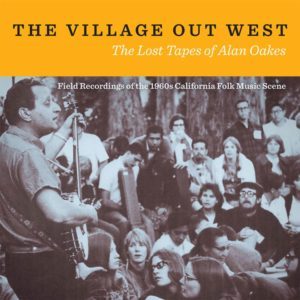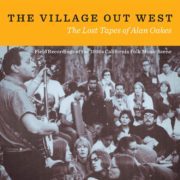The Village Out West: The Lost Tapes of Alan Oakes
 The folk music scare of the 1960s had many centers around the country. The one in Greenwich Village in New York is probably the best-known and the best-documented. Another, in Berkeley, California, is probably less well-known outside the San Francisco Bay Area, but it was also a wellspring of traditional music.
The folk music scare of the 1960s had many centers around the country. The one in Greenwich Village in New York is probably the best-known and the best-documented. Another, in Berkeley, California, is probably less well-known outside the San Francisco Bay Area, but it was also a wellspring of traditional music.
This new double CD with 49 tracks from Smithsonian Folkways describes itself as “Field Recordings of the 1960s California Folk Music Scene.” It is produced by three people I know, two of whom I have met. Deborah Robins found the tapes, Hank Sapoznik helped with the liner notes, and Jeff Place works for the record label. I also knew/know many of the performers on this recording so I am going to discuss it both in terms of the music as well as of the people themselves.
The first cut on CD 1 is “Beaumont Rag” ably fiddled and picked by Hank Bradley, Rick Shubb, and Doc Watson. I have never met Rick or Doc, though I have some of Rick’s capos and I have seen both perform live. I first met Hank in Mt. Airy, North Carolina in 1994. I had spent the day hanging out with Tennessee fiddler Ralph Blizzard listening to him jam. Finally, nobody was left but Ralph and I, and Ralph insisted that I get out my banjo and play with him. That was when Hank walked up. Since then we have crossed paths many times, and I once jammed with him at a party at his cousin’s house. This marvelous trio was also captured playing “Orange Blossom Special,” “Ragtime Annie,” “Billy in the Lowground,” and “O, Them Golden Slippers.” Doc also sings solo on Carson Robison’s “The Clouds Gwine Roll Away” and on “The Billboard Song.”
Hank also appears with Sandy Rothman and Doc Watson; they play “Cherokee Shuffle.” I also know Sandy and have seen him perform. Sandy plays banjo, but he is also a fine guitarist. I have a favorite memory of him at a hotel festival on the San Francisco peninsula. Sandy was performing on stage in a guitar duet with another friend of mine, Steve Pottier. Sandy had played in Bill Monroe’s band, and Bill was in the audience. Bill called out from the audience that he wanted to join them on stage. Steve and Sandy invited him up, and he joined them.
Larry Hanks and Roger Perkins sing Pete Seeger’s “Oh, Had I a Golden Thread.” I don’t remember when I first met Larry, who is also Deborah’s husband, but I once went to a birthday party at his house. I replaced Ron Tinkler on banjo in a jam with Harry Liedstrand, and I looked over my shoulder to see Larry accompanying us on a jaw harp. Larry also appears with Mark Spoelstra to sing Woody Guthrie’s “Walking Down that Railroad Line.” I have never met Mark, but in 1963, I saw him perform at a folk festival at Williams College. Mark also sings his “Play Run Run.” Larry appears in other combinations. First, he joins Roger Perkins, Kathy Larisch, and Carol McComb to sing “Northfield.” I know Carol, too. Then Larry sing’s Woody’s “Talking Fishing Blues.” Larry did a medley of “Charlie’s Neat and Charlie’s Sweet” and “Weevilly Wheat” with Jerry Houck and Tom Ninkovich. Kathy and Carol also sang Richard Fariña’s “Swallow Song” and “Searchin‘” with Will Scarlett, whom I know, on harmonica. Jerry Houck also sang “Sweet Sunny South.”
I never met Ron Hughey, Frank Hicks, and Pete Everwine, who perform “Westphalia Waltz,” but I heard a lot of stories about them at Sweet’s Mill. The waltz originated in Poland, and my friend, Joe Weed, produced an hour-long documentary (available here) in which he traced it back to its source. Hughey and Hicks also combined to play “Good Night Waltz.”
LaWanda Ultan sings “Raggedy Pat” a capella. I met LaWanda at the Mill, and I once went to a party at her house.
The Sweet’s Mill Mountain Boys with Kenny Hall play “8th of January,” “Girl I Left in Sunny Tennessee” (joined by Jim Ringer and Ron Tinkler), “Texas Quickstep,” “Fire on the Mountain,” “Paddy Won’t You Drink Some Cider,” and “The Lost Trapper.” I met Kenny at the Mill, too, and had the chance to jam with him a lot, and perform once. Just before Kenny died, a friend and I drove to a Basque restaurant in Fresno, where there was a weekly jam. Kenny was brought in a wheelchair and put right next to me.
Merritt Herring sings “Leaning on the Everlasting Arms,” “Down, Down, Derry Down,” and “The Curlew’s Song.” Merritt used to lead a singing session at the Mill, and I went to it a few times.
I never met bluesman Mississippi Fred McDowell, who sings “Write Me a Few of Yo’ Lines” and “Don’t Mistreat Nobody (Cause You Got a Few Dimes.” But I was fortunate to have met the amazing guitarist Rev. Gary Davis in 1963. My older brother was taking guitar lessons from the Reverend, and my brother brought me up to his apartment and introduced me. That evening the Reverend performed at a benefit for the upcoming March on Washington, and we went to that, too. Gary Davis does “Gimme That Old Time Religion,” “Baby, Let Me Lay It on You,” and “Hesitation Blues” on this recording.
Dr. Humbead’s New Tranquility String Band plays Charlie Poole’s “Milwaukee Blues.” The band consisted of Jim Bamford, Mac Benford, and Sue Draheim. I first met Mac in Mt. Airy. Mac drove in, and my friend, Gail Gillespie, said “Let’s go bother Mac.” The three of us jammed together. Sue was my second fiddle teacher, and I took a few lessons from her. I first saw her in the Any Old Time String Band.
Gene Bluestein sings “Talking Union.” I never met Gene, but his sons Evo and Jemmie are friends of mine. Jemmie told me that Gene was the first director of Sweet’s Mill when it became a music camp.
Kilby Snow, an amazing autoharpist, sings “All My Friends Are Gonna Be Strangers” and “Bringing Mary Home.”
Caroline Paton sings a lovely version of “Long Time a-Growing” and then joins Sandy Paton to do “Sardines and Pork and Beans” and “I’m a Rover and Seldom Sober.”
Jerry Houck does “Mardi Gras Dance.” Don Hollins (aka Abel Fortune) sings “The Lady of Carlisle.” Ed Trickett performs “Duna.” Sandy and Jeanie Darlington sing Woody’s “When the Curfew Blows.” Roger Renwick did “Jimmy Whelan.”
Dad Crockett of Crockett’s Kentucky Mountaineers fiddles “Hoop-e-Kack” backed up by Frank Hicks. A few years ago, I met fiddler Cindy Crockett, whose husband is a grandson of Dad Crockett.
Allan Macleod, whom I don’t know but who later performed in a duo with my buddy, Dick Holdstock, sings “The Hounds Are Out (The Innocent Hare).”
The New Lost City Ramblers, all of whom I met, played “Bachelor Blues.” I met Mike Seeger first in Mt. Airy at the first Old-Time Music and Radio conference, and we crossed paths many times after that. I met Tom Paley at the same hotel festival I mentioned earlier and jammed with him. I don’t know when I first met Tracy Schwarz, but it was probably through his wife, Ginny Hawker. John Cohen took a photo of me playing with Jake Krack and Lester McCumbers in West Virginia. I think that photo is in his posthumous photo book, but it looks as if I was cropped out.
Will Spires, another friend from the Mill, sang “Jamie Raeburn’s Farewell.”
Even if you never met any of these people, there is a lot of great music on these two CDs.
The recordings can be purchase from Smithsonian-Folkways Recordings where you can either download it or get the CDs. The YouTube cuts are all truncated.













